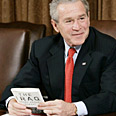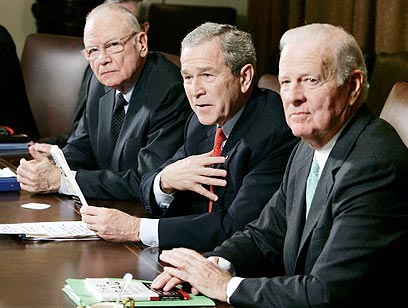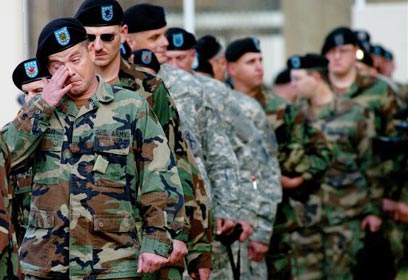
Key to Iraq: Solving Israeli-Arab conflict
Bipartisan Iraq Study Group calls for direct talks between Israel, Syria as part of revived US commitment to a comprehensive Arab-Israeli peace 'on all fronts.' Report also recommends that US forces begin to withdraw from combat in Iraq, calls for new diplomatic, political push to improve 'grave and deteriorating' situation
"This commitment must include direct talks with, by and between Israel, Lebanon, Palestinians (those who accept Israel's right to exist), and Syria," the report said.
The high-level panel also stated that the United States should begin to withdraw its forces from combat in Iraq and launch a diplomatic push, including Iran and Syria, to prevent "a slide toward chaos" in the country.
The bipartisan Iraq Study Group also pushed Washington to reduce its political, military or economic support for Iraq if its government fails to advance security and national reconciliation in the country, where sectarian violence kills scores of people every day.
It also called for the Bush administration to engage with Iran and Syria, whom US officials accuse of fomenting the insurgency in Iraq, and to press for a "comprehensive Arab-Israeli peace" to settle the festering conflict.
- To read the full report click here
US President George W. Bush said he would take the report "very seriously" after meeting with the bipartisan group, but the White House has made clear he will not be bound by its conclusions and has begun its own review of Iraq policy.
"The situation in Iraq is grave and deteriorating," the five Republicans and five Democrats in the group said in the report. "There is no magic formula to solve the problems of Iraq," they added.
"Our most important recommendations call for new and enhanced diplomatic and political efforts in Iraq and the region and a change in the primary mission of US forces in Iraq that will enable the United States to begin to move its combat forces out of Iraq responsibly," the report said.

Baker (R) and Hamilton present Bush with report (Photo: Reuters)
"The primary mission of US forces in Iraq should evolve to one of supporting the Iraqi army, which would take over primary responsibility for combat operations," it added.
While it set no hard timetable for the transition, the report said that by the first quarter of 2008 US combat troops not needed for "force protection" could be out of Iraq, depending on security conditions in the country.
More than 3-1/2 years after the March 2003 invasion that toppled Saddam Hussein, about 140,000 American troops remain in Iraq fighting an insurgency and trying to stop savage sectarian strife between Shi'ites and Sunnis.
"If the situation continues to deteriorate, the consequences could be severe. A slide toward chaos could trigger the collapse of Iraq's government and a humanitarian catastrophe. Neighboring countries could intervene ... al Qaeda could win a propaganda victory," the report said.
Political pressure
Bush has been under acute political pressure to change course in Iraq since the November 7 elections, when US voters, soured on the war, ended Republican control of Congress.
"This report gives a very tough assessment of the situation in Iraq," Bush said after meeting with the group. "I told the members that this report, called 'The Way Forward,' will be taken very seriously by this administration."
Analysts suggested that the report would add to pressure on Bush to find a solution to a conflict that has already lasted longer than the US involvement in World War Two.
"This could provoke an earthquake and leave the president very isolated if he refuses to change course," said Jon Alterman, of the Center for Strategic and International Studies in Washington.

US soldiers on their way to Iraq (Photo: AP)
In the clearest sign Bush is searching for solutions, a day after the Republicans' humiliating election losses he tapped former CIA Director Robert Gates to replace Defense Secretary Donald Rumsfeld, an architect of the war who became a favorite target of critics.
The idea that the US begin to withdraw troops from combat in Iraq rests on what analysts regard as a highly questionable assumption that Iraqi security forces are capable of taking over responsibility and staunching the bloodshed.
The report also recommended that the US military launch a rapid effort to train Iraqi forces to defend their country and said US forces should gradually move to a supporting role.
It set no hard timetable for the transition but said, by the first quarter of 2008, depending on conditions, US combat troops not needed for "force protection" could be out of Iraq.
In one of its harshest recommendations, the group suggested the United States should begin to withdraw support if Iraq's government does not make major progress toward national reconciliation, improved security and better governance.
"The United States must not make an open-ended commitment to keep large numbers of American troops deployed in Iraq," it said. "If the Iraqi government does not make substantial progress toward the achievement of milestones on national reconciliation, security and governance, the United States should reduce its political, military or economic support."
Hundreds of Iraqis are being killed in sectarian violence every week, raising debate over whether the country has descended into civil war and whether the US-backed government of Prime Minister Nuri al-Maliki can stem the carnage.
Bush is not committed to accept the panel's recommendations. On the one hand, he is under very heavy pressure, but simultaneously, sources at the White House say that the report in itself is not a magic solution for the difficult problems in Iraq.
Sources said that the president would examine the committee's recommendations and will simultaneously receive the recommendations of other commissions of inquiry inside the White House and the Pentagon.
Former Secretary of State James Baker has already rescued the Bush family members from difficulties in the past, but the president's public reactions in the past few days do not imply that he plans to set a schedule for the forces' withdrawal or to talk directly with Iran and Syria.
Yitzhak Benhorin contributed to the report










